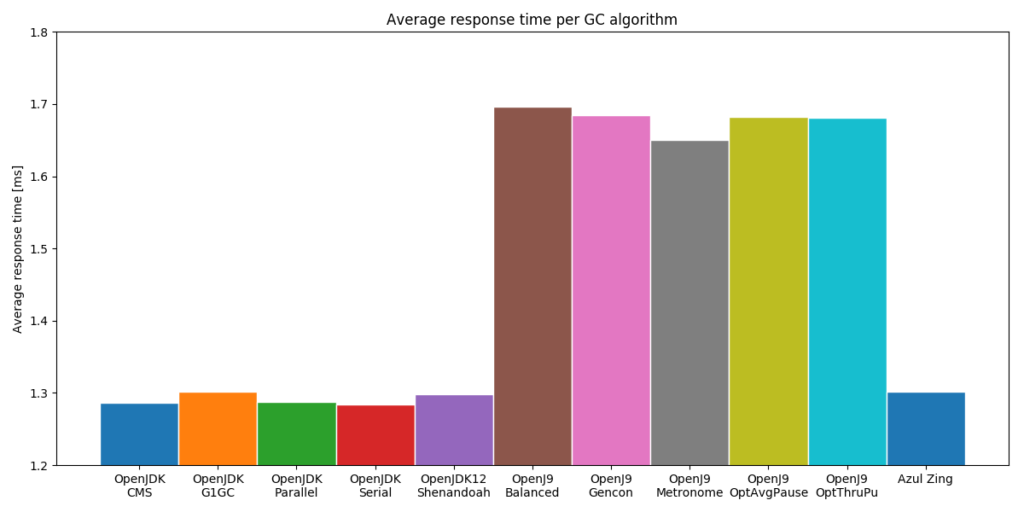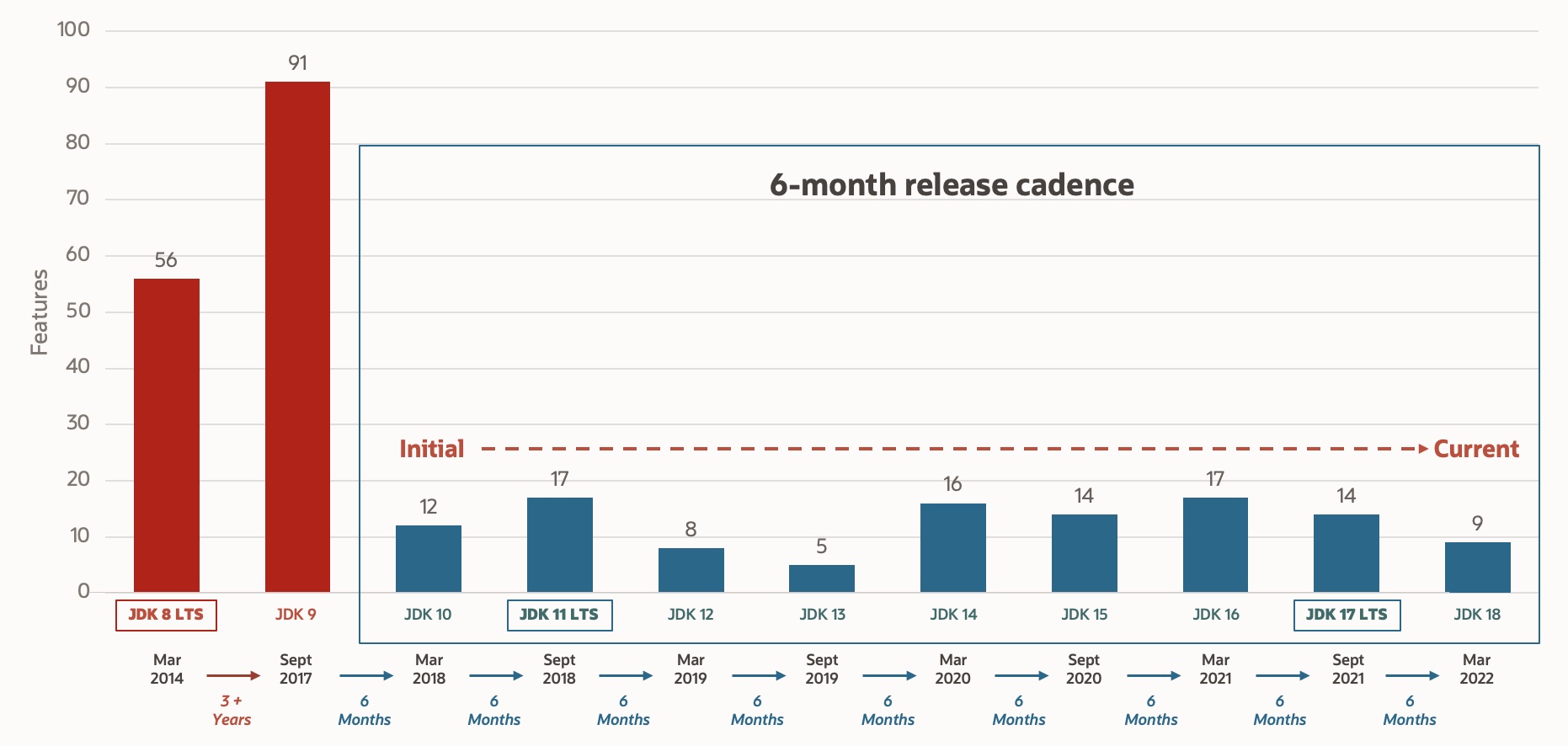Java 17 is 6.54% faster than Java 11 and 0.37% faster than Java 16 for ParallelGC(Parallel Garbage Collector). 3. The Parallel Garbage Collector(Available in Java 17) is 16.39% faster than the G1 Garbage Collector(Used in Java 11).Java 17 includes enhancements in garbage collection algorithms and performance, reducing pause times, improving throughput, and optimizing memory management, thereby increasing application performance and reliability.Java Client Applications May Use Significantly More Memory and CPU after Upgrading to JDK 11 or Later.
Should I upgrade to Java 17 : Java 17 provides multiple security updates, including improved TLS 1.3 support, updated cryptographic algorithms, and fixes for potential vulnerabilities found in earlier versions. Upgrading to Java 17 ensures that your application is secure and protected against potential threats.
Is Java 17 faster than Java 8
In terms of throughput, there is not much difference between JDK 8 and JDK 11 in Parallel, and JDK 17 is about 15% higher than JDK 8. JDK 17 in G1 is 18% higher than JDK 8.
Does Java 17 require more memory : After migrating to Java 17, we observed a significant 1GB increase in memory usage of the container as compared to the memory usage of the container running on Java 8 (we compared the memory using the docker stats command for both the containers). We only have the Java process running inside the container.
Java's competitive advantage shines here as backward compatibility allows you to switch to Java 17 without any code changes and take advantage of all the updated features. Version 17 is a Long-term Support version, ensuring you receive all the necessary security updates for an extended period. For most workloads, Java 21 is the fastest Java version ever released.
How much faster is Java 11
Java 11 brings additional improvements, which vary across different OptaPlanner examples and data sets. On average, it is 4.5% faster when using Parallel GC and 16.1% faster with G1 GC. Despite the significant improvement for G1 GC, Parallel GC is still faster for most data sets in this benchmark.Applications written in Java 11 are faster and more secure than Java 8 as it upgraded to support TLS 1.3, which is more secure than the previous versions. Also, CORBA and Java EE modules have been removed from Java 11 to tackle security issues. So, one should upgrade from Java 8 to Java 11.As an LTS release, Java 17 prioritizes stability, providing a reliable platform for mission-critical web and mobile application development solutions. The Java ecosystem prioritizes support for the latest Java versions, including Java libraries, IDEs, build tools, and frameworks. Java's competitive advantage shines here as backward compatibility allows you to switch to Java 17 without any code changes and take advantage of all the updated features. Version 17 is a Long-term Support version, ensuring you receive all the necessary security updates for an extended period.
Is Java 11 faster than 8 : Applications written in Java 11 are faster and more secure than Java 8 as it upgraded to support TLS 1.3, which is more secure than the previous versions. Also, CORBA and Java EE modules have been removed from Java 11 to tackle security issues. So, one should upgrade from Java 8 to Java 11.
Is Java 18 better than 17 : Java 18 updates: The difference
As for Java 18, there is only a six-month time difference between it and Java 17, which means the updates aren't as trascendental or numerous as we've been able to see with other releases. However, Java 18 has improvements in terms of its foreign function memory.
Why Java 11 is better
Java 11 has improved garbage collection due to garbage collectors like ZGC and Epsilon. Thus, applications in Java 11 are faster and more secure than in Java 8. Java 17 is mostly backwards-compatible with older Java versions, so existing modules will continue to work regardless of the compiler version used to create the module. Starting with FirstSpirit 2023.11, artifacts like the isolated-runtime jar will require Java 17 to compile when used as a dependency in your project.For most workloads, Java 21 is the fastest Java version ever released.
Antwort Is Java 17 slower than Java 11? Weitere Antworten – Is Java 17 better than Java 11
Java 17 is 6.54% faster than Java 11 and 0.37% faster than Java 16 for ParallelGC(Parallel Garbage Collector). 3. The Parallel Garbage Collector(Available in Java 17) is 16.39% faster than the G1 Garbage Collector(Used in Java 11).Java 17 includes enhancements in garbage collection algorithms and performance, reducing pause times, improving throughput, and optimizing memory management, thereby increasing application performance and reliability.Java Client Applications May Use Significantly More Memory and CPU after Upgrading to JDK 11 or Later.
Should I upgrade to Java 17 : Java 17 provides multiple security updates, including improved TLS 1.3 support, updated cryptographic algorithms, and fixes for potential vulnerabilities found in earlier versions. Upgrading to Java 17 ensures that your application is secure and protected against potential threats.
Is Java 17 faster than Java 8
In terms of throughput, there is not much difference between JDK 8 and JDK 11 in Parallel, and JDK 17 is about 15% higher than JDK 8. JDK 17 in G1 is 18% higher than JDK 8.
Does Java 17 require more memory : After migrating to Java 17, we observed a significant 1GB increase in memory usage of the container as compared to the memory usage of the container running on Java 8 (we compared the memory using the docker stats command for both the containers). We only have the Java process running inside the container.
Java's competitive advantage shines here as backward compatibility allows you to switch to Java 17 without any code changes and take advantage of all the updated features. Version 17 is a Long-term Support version, ensuring you receive all the necessary security updates for an extended period.

For most workloads, Java 21 is the fastest Java version ever released.
How much faster is Java 11
Java 11 brings additional improvements, which vary across different OptaPlanner examples and data sets. On average, it is 4.5% faster when using Parallel GC and 16.1% faster with G1 GC. Despite the significant improvement for G1 GC, Parallel GC is still faster for most data sets in this benchmark.Applications written in Java 11 are faster and more secure than Java 8 as it upgraded to support TLS 1.3, which is more secure than the previous versions. Also, CORBA and Java EE modules have been removed from Java 11 to tackle security issues. So, one should upgrade from Java 8 to Java 11.As an LTS release, Java 17 prioritizes stability, providing a reliable platform for mission-critical web and mobile application development solutions. The Java ecosystem prioritizes support for the latest Java versions, including Java libraries, IDEs, build tools, and frameworks.

Java's competitive advantage shines here as backward compatibility allows you to switch to Java 17 without any code changes and take advantage of all the updated features. Version 17 is a Long-term Support version, ensuring you receive all the necessary security updates for an extended period.
Is Java 11 faster than 8 : Applications written in Java 11 are faster and more secure than Java 8 as it upgraded to support TLS 1.3, which is more secure than the previous versions. Also, CORBA and Java EE modules have been removed from Java 11 to tackle security issues. So, one should upgrade from Java 8 to Java 11.
Is Java 18 better than 17 : Java 18 updates: The difference
As for Java 18, there is only a six-month time difference between it and Java 17, which means the updates aren't as trascendental or numerous as we've been able to see with other releases. However, Java 18 has improvements in terms of its foreign function memory.
Why Java 11 is better
Java 11 has improved garbage collection due to garbage collectors like ZGC and Epsilon. Thus, applications in Java 11 are faster and more secure than in Java 8.

Java 17 is mostly backwards-compatible with older Java versions, so existing modules will continue to work regardless of the compiler version used to create the module. Starting with FirstSpirit 2023.11, artifacts like the isolated-runtime jar will require Java 17 to compile when used as a dependency in your project.For most workloads, Java 21 is the fastest Java version ever released.